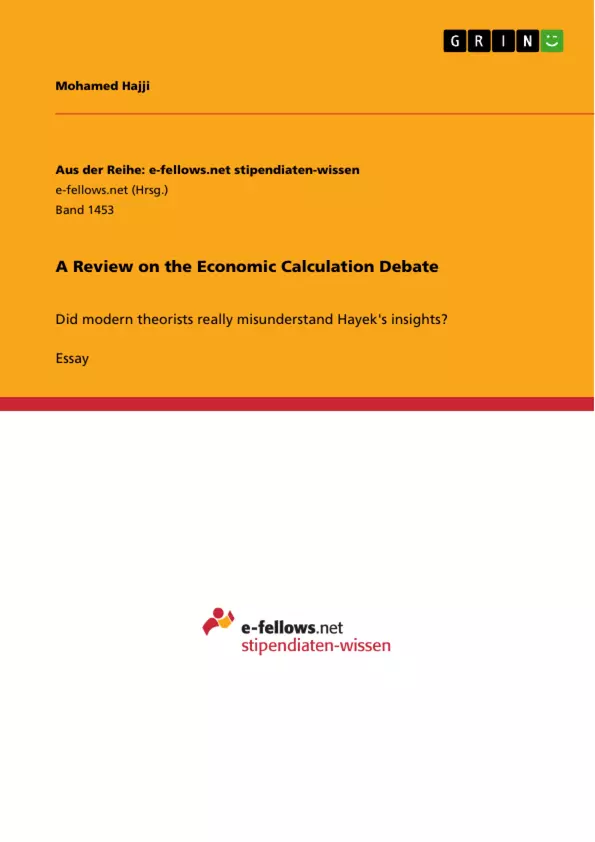Friedrich August von Hayek is well known as a rigor criticizer of market socialism. His contribution to the socialist calculation debates was difficult, to interpret for modern information theorists and mechanism design theorists. In this regard, many theorists have misunderstood Hayek ́s contribution to the socialist calculation debate until today. Therefore, the question still arises: Did modern theorists really misunderstand Hayek ́s insight? The answer to this question can be found by understanding Professor Caldwell’s arguments in his paper just mentioned above and various studies referring to the discourse of the calculation debates.
In the paper Hayek and Socialism, Professor Caldwell analyzes Hayek ́s participation in the socialist calculation debate from the 1930s and 1940s. Furthermore, he reviews the new debate on market socialism. The particularity was that he considers the intellectual environment in which Hayek’s thought was evolved.
Hayek was involved in a variety of discussions with advocates for the market socialism such as Lange and Lerner. One of his essential contributions to the calculation debates was published in Collectivist Economic Planning and includes a series of essays like Individualism and Economic Order, Economic and Knowledge, The Use of Knowledge in Society and The Meaning of Competition. In general, they contain Hayek ́s explanation for the failure of the market socialism and further throw light on difficulties caused by state interventionism that still exist today.
Table of Contents
- I. Introduction
- II. A question of interpretation?
Objectives and Key Themes
This paper aims to examine the interpretation of Friedrich August von Hayek's contribution to the socialist calculation debate by modern information and mechanism design theorists, specifically addressing the question of whether these theorists truly misunderstood Hayek's insights. It analyzes the arguments presented by Professor Caldwell in his paper "Hayek and Socialism" and explores the implications of these arguments for understanding the development of economic thought.
- Hayek's criticism of market socialism and the "dispersion of knowledge" concept.
- The role of information asymmetries and incentive compatibility in the failure of socialist regimes.
- The limitations of neoclassical economic theory in addressing the challenges of socialist planning.
- The contrast between Hayek's warning against authoritarianism and the interpretation of his work as a prediction.
- The implications of Hayek's insights for modern information theory and mechanism design.
Chapter Summaries
The introductory chapter sets the context for the paper by outlining Hayek's criticism of market socialism and the ongoing debate surrounding his insights. It highlights the importance of understanding the intellectual environment in which Hayek's thought evolved, particularly in relation to his discussions with proponents of market socialism like Lange and Lerner.
Chapter II delves into the question of whether modern information theorists have truly understood Hayek's work on the "dispersion of knowledge." It examines Professor Caldwell's argument that modern theorists have grasped Hayek's insights regarding the role of price signals in conveying information and the limitations of central planning in acquiring dispersed knowledge. However, it suggests that a deeper understanding of Hayek's ideas regarding tacit knowledge and the limitations of neoclassical theory might be lacking.
Keywords
The paper focuses on key concepts such as socialist calculation, market socialism, information asymmetries, incentive compatibility, dispersed knowledge, tacit knowledge, mechanism design, and the limitations of neoclassical economic theory. It explores the historical development of economic thought, particularly the debate surrounding Hayek's contributions to the socialist calculation debate.
Frequently Asked Questions
What was Hayek's main criticism of market socialism?
Hayek argued that central planners cannot aggregate the dispersed and tacit knowledge held by individuals, which is necessary for efficient economic calculation.
Who were Hayek's main opponents in the calculation debate?
His primary intellectual adversaries were proponents of market socialism, most notably Oskar Lange and Abba Lerner.
What is the "dispersion of knowledge" concept?
It is the idea that essential economic information exists only as bits of incomplete and frequently contradictory knowledge which all separate individuals possess.
Did modern theorists misunderstand Hayek's insights?
The paper examines Professor Caldwell's argument that while modern theorists grasp price signals, they often overlook Hayek's deeper points on tacit knowledge and neoclassical limitations.
Why did Hayek believe market socialism would fail?
Beyond the knowledge problem, he pointed to issues with incentive compatibility and the inability of state intervention to mimic competitive market processes.
- Citar trabajo
- Mohamed Hajji (Autor), 2015, A Review on the Economic Calculation Debate, Múnich, GRIN Verlag, https://www.grin.com/document/300191



